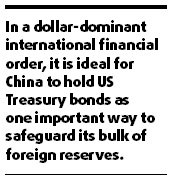Op-Ed Contributors
Market to dictate US holdings
By Xi Xianrong (China Daily)
Updated: 2010-02-22 07:40
 |
Large Medium Small |
China's decisions on its holdings of United States Treasury bonds should be based on its accurate market judgments, not on opinion-swaying proposals by some nationalistic academics.
China slashed its holdings of US bonds to $755.4 billion in December from $789.6 billion the previous month, the lowest level since last February, according to recent US Department of Treasury data.
The latest $34.2 billion reduction, or 4.3 percent, was the fifth time that China cut down its US national debt last year. It brought down the proportion of the US bond holdings in China's foreign reserves from 37 percent at the end of 2008 to 33 percent in late last November.
| ||||
When China's foreign reserves expanded rapidly in recent years, different and even conflicting voices arose within the country about how best to utilize the reserves. Some scholars proposed that the Chinese government should use its ever-expanding reserves as a forcible card to deal with Washington, some believed that the reserves should be used to purchase gold and oil to change China's previous US debt-dominant investment model.

Some even suggested that the government should threaten to slash its holding of US bonds if the US administration stubbornly keeps turning a blind eye to China's reactions to the US sale of weapons to Taiwan.
In a democratic and academically diversified society, everyone is entitled to express his or her viewpoints, even prejudiced opinions, on national issues. But decision markers should remain particularly cautious and level-headed about whether or not these viewpoints will influence their decision-making on significant issues. In a dollar-dominant international financial order, it is ideal for China to hold US Treasury bonds as one important way to safeguard its bulk of foreign reserves.
Despite growing dissatisfaction among the international community about the current global financial structure, the time-honored system is not expected to collapse and be replaced in the near future. What China should now do is try to maintain and maximize its national interests and refrain from breaking away from the old global financial system.
Provided that the current financial system will not change, and the dollar will remain the world's leading currency, China would face lesser risks if it chooses to hold dollar-denominated assets.
The value of a country's currency is built on its national competitiveness. The financial crisis in 2008 has indeed brought enormous trauma to the US and plunged the world's largest economy into a full recession. But no single country in the world has so far become powerful enough to match the US in terms of economic strength.
As the world's sole superpower, the US' well-developed educational system, its strong innovative abilities in technology and finance, along with its legal, judicial and political frameworks, are all expected to help Washington continue to hold the world's leading economic position in the coming decades. Thus holding dollar-denominated properties would mean smaller financial risks for a holding country, especially in the era of economic and financial globalization in which turbulences in the global market are expected to arise from time to time.
China's success in keeping its enormous foreign reserves from suffering much in the latter half of 2008 can serve as a convincing example. When the global financial crisis struck at that time, the country's reserves avoided a heavy loss because it heavily invested in US government debts in sharp contrast with about 30 percent losses in other financial markets.
If holding dollar-denominated assets is believed to be a high-risk move, then the question would be: How can China place its reserves at a lower risk in a world with an accelerated economic and financial globalization?
Some believe investment diversification can serve as an effective way to reduce a country's overseas investments. Diversifying a country's investments would possibly help lower risks, but where can China invest now that it has a large volume of foreign reserves?
Purchasing such properties in kind as gold and oil is possibly not a bad choice, as some expected, but this is no different from investing in financial products in a world where financial, futures and currency products have dominated almost all investment sectors.
But the scenario can't be ruled out that a country at times deploys its reserves as a political chip when struggling to develop ties with another nation. Yet the hard-won wealth China has managed to obtain until now should be handled mainly according to market principles, rather than ideological factors. In so doing, the country will be able to effectively reduce risks for its foreign reserves and maintain the value of its colossal overseas assets.
The author is a researcher with the Institute of Finance and Banking under the Chinese Academy of Social Sciences.
(China Daily 02/22/2010 page6)













